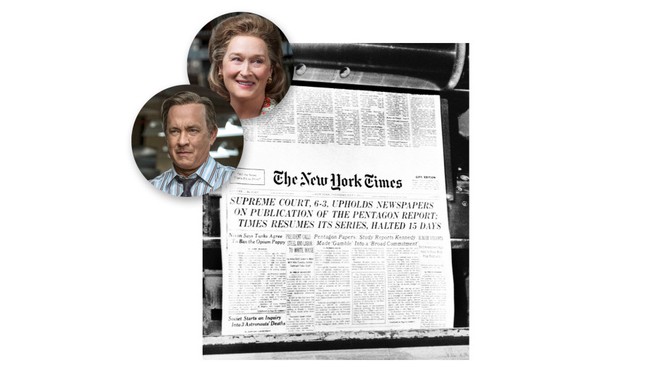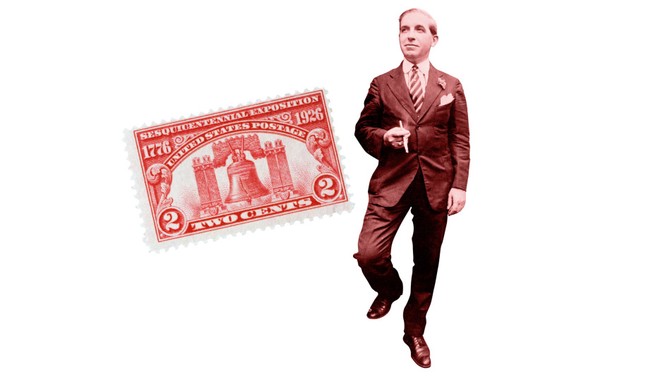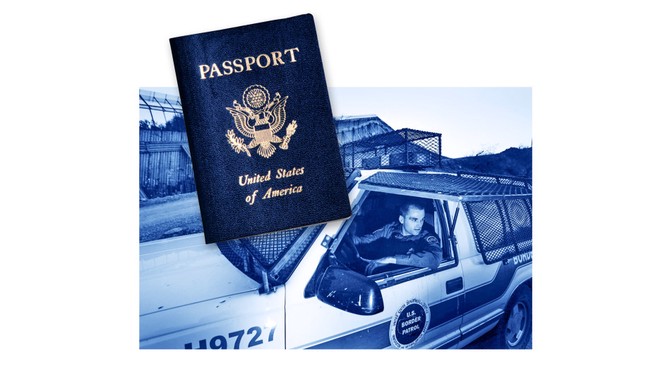The True Story Behind Steven Spielberg's New Movie, The Post
In honor of dogged truth tellers everywhere, here are a few more real-life stories Mr. Spielberg might want to dig into.
By Zoe Donaldson

Hanks & Streep: Niko Tavernise. New York Times: Jim Wells/AP
Truth Be Told
Newspapers face a challenge today like never before: combat fake news and tweetstorms with vital-to-democracy reporting. Need a reminder of just how vital? Make a date to see Steven Spielberg's new movie, The Post (out nationwide January 12), which celebrates one of journalism's finest hours: when the Washington Post and New York Times fought for and won the right to publish portions of the Pentagon Papers, a 7,000-page document that exposed the U.S. government's missteps in the Vietnam War. The film stars Tom Hanks as Washington Post executive editor Ben Bradlee and Meryl Streep as the paper's publisher, Katharine Graham.

Ponzi: Bettmann Archive/Getty. Stamp: Bridgeman Images.
No Money, More Problems
Dateline: Boston, July 1920. Charles Ponzi (yes, that one—Bernie Madoff's spiritual crookfather) swindles unsuspecting investors out of millions in a scam involving international prepaid postal stamps. Ponzi—we're thinking Robert Downey Jr.—even has the press charmed, with the Boston Post publishing a front-page profile titled "Doubles the Money Within Three Months." That is, until the con man's own publicist reveals to the Post his staggering debt, and the paper finds a previous arrest for check fraud. By August, its reporting has paved the way to Ponzi's arrest.

Photo: Transcendental Graphics/Getty Images
Anti-Mob Mentality
Journalists Horace Carter and Willard Cole, of North Carolina's Tabor City Tribune and Whiteville News Reporter, respectively, began investigating Ku Klux Klan activity in 1950. They witnessed cross burnings, recorded Klan members' license plate numbers and used their papers to condemn white supremacist poison. Despite death threats, Carter (a baby-faced Joseph Gordon-Levitt?) and Cole (a white-haired Willem Dafoe?) wrote more than 300 stories on the Klan in just three years and heroically ferried tips to the FBI. Movie tagline: "The pen is mightier than the torch."

Photo: Taro Yamasaki/The Life Images Collection/Getty
#HerToo
A newspaper editor calls for rape victims to speak openly about their assaults. A survivor resolves to share her story. A journalist sheds light on her subject's struggle. Those three brave moves—by Geneva Overholser (then editor of the Des Moines Register), Nancy Ziegenmeyer (then-29-year-old mom of three who'd been raped in 1988, pictured above) and Jane Schorer (then reporter for the Register)—lead to a 1990 series of articles that sparks an outcry against rape stigma and reveals the trauma's ripple effects. We see Brie Larson, Emma Stone and Elisabeth Moss as the intrepid squad.

Border: Mark Boster/LA Times via Getty. Passport: Getty.
Taking Liberties
Deportland isn't a new Portlandia spin-off; it's the nickname Portland, Oregon, earned in 2000 after immigration officers at the city's airport barred many foreign travelers from entering. Muscle flexing by the Immigration and Naturalization Service sent journalists at the Oregonian on a four-month investigative tear. What if the stories of those affected—a family ripped apart because of bungled paperwork, a Sri Lankan asylum seeker who was jailed for almost four years—unfolded as interlocking, hauntingly human vignettes? Travel bans, take cover.

izusek/iStock
Extra, Extra!
There's nothing like the snap of a perfectly folded page of newsprint. But investigative journalism is making headway in the digital space, too. Concerned about gun violence? The Trace produces a daily newsletter that reports on everything from unregulated bump stocks to the huge cost of treating gunshot victims. Frantic about climate change? Warm Regards is a podcast that aims to humanize the crisis and poke holes in disbelievers' nondata. Wringing your hands over healthcare? VoxCare's newsletter is your go-to, with stories about drug companies behaving badly, anti-vaxxers, spiking insurance premiums and more. Sign up, tune in and start getting the facts.
From the January 2018 issue of O, The Oprah Magazine

